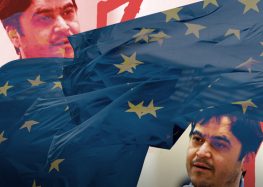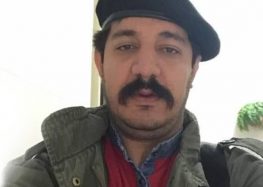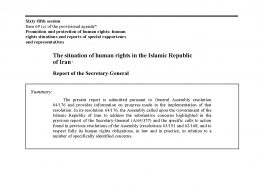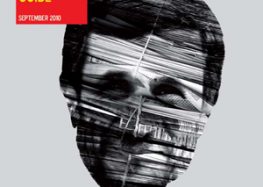An Appeal to the EU to Act, As Human Rights Deteriorate in Iran
(Brussels, 7 May 2008) The European Union (EU) should deny visas to Iranian officials who have participated in grave human rights abuses and freeze bank assets held in the EU, according to an appeal made by the International Campaign for Human Rights in Iran. The group also asked the EU to encourage European corporations to use their contacts with Iranian authorities to advocate for abolition of juvenile executions and other practices that contradict international human rights standards.
“The human rights situation in Iran is deteriorating precipitously,” Campaign coordinator Hadi Ghaemi told a press conference in the European Parliament. “Iran’s intransigence on nuclear non-proliferation issues has diverted international attention and allowed Iran to ratchet up its persecution of women, minorities, labor activists and students at no cost. It will take more than demarches to convince Iran that the EU is serious about human rights,” he said.The International Campaign for Human Rights in Iran believes the EU and its members should firmly and resolutely condition diplomatic and trade relations with Iran on Iran’s demonstrated commitment to human rights principles as articulated in the Universal Declaration of Human Rights and the other standards, which Europe and Iran hold in common.
Over the past years, the EU has pursued several venues to bring its human rights concerns about Iran to the government. These include public statements by the European Parliament and the Council of the European Union, inter-governmental discussions, and a human rights dialogue that was unilaterally suspended by Iran. There have been no serious improvements in Iran’s human rights record in response to these initiatives. The Iranian government has repeatedly and routinely ignored Europe’s concerns, and, presumably, will continue to do so as long as they are decoupled from other political and economic ties with the EU.
The Campaign believes the Iranian government can and must be persuaded that honoring its obligations under international human rights treaties and respecting the fundamental rights of its citizens will tangibly improve its relations with the EU, whereas continuing refusal to address these concerns will adversely affect political and economic ties.
The Iranian government has shut all doors to human rights dialogue with the international community. It refuses to honor its standing invitation to United Nations independent Special Rapporteurs to visit the country. It routinely ignores resolutions by the UN General Assembly expressing serious concern at Iran’s deteriorating human rights record and calling for adherence to obligations undertaken in UN treaties. Iran is one of only a few countries denying access to independent, international human rights organizations. Since 2005, Iran has also unilaterally suspended its human rights dialogue with the EU.
In absence of such mechanisms, EU should use all other opportunities and interactions with the Iranian government to initiate discussion of human rights issues on par with other engagements.
“This is imperative at this juncture, when the EU can demonstrate its commitment and leadership by encouraging and convincing the Iranian government to abide by its international obligations,” Ghaemi said.
Failure to address the deterioration of human rights in Iran will contribute to making it worse. Iran leads the world in executing children and is second only to China in the total number of executions. At least 107 minors are on the death row for crimes they allegedly committed before the age of 18. While executions in China, as recorded by Amnesty International, fell sharply compared to a year ago, they doubled in Iran. Over the past year, at least four social activists belonging to the Kurdish and Baluchi minorities have been sentenced to death following unfair trials, and in the absence of convincing evidence: Farzad Kamanger, Adnan Hassanpour, Hiwa Butimar, and Yaghoub Mehrnahad. In Kamangar’s case, according to his lawyer, there is “absolutely zero evidence” to support charges leading to his death sentence.
Iran continues to carry out execution by stoning, and at least ten women and two men are awaiting execution by stoning. Cruel and inhumane punishments such as cross amputations of an arm and a leg (five cases carried out in Sistan and Balushistan in January 2008) and flogging sentences are implemented. Several women’s rights and labor activists have been sentenced to flogging for their peaceful actions. Over 120 students throughout the country were detained by security and intelligence agents over the past six months alone; thirteen remain imprisoned, while the others have been released on bail and are subject to further prosecution. One student detainee, Ibrahim Lotfollahi, detained on 6 January 2008 by security agents in Sanandaj, died in detention under suspicious circumstances. The authorities buried him without allowing his family access to his body. Emad Baghi, a prominent human rights defender, is serving a one- year prison sentence for articles he wrote years ago and for which he was already prosecuted and imprisoned. Reformist cleric Hadi Ghabel has been imprisoned following a trial that has been likened to the Inquisition trials of the Middle Ages. Political activist, Abbas Khorsandi, has been incarcerated for a term of eight years. As the Iranian economy falters due to government mismanagement, violations of economic and social rights have become more acute. Attempts to form independent unions to protect workers’ rights in accordance with international law are brutally suppressed. Labor leader, Mansour Osanloo is serving a five year sentence for his trade-union activities.
These cases represent only a fraction of the grave human rights violations in Iran today. The International Campaign for Human Rights in Iran thus urges the EU and its member states to more forcefully apply political and economic leverage directed at improving the human rights situation. The Campaign makes the following recommendations to the EU:
- Institute travel bans and asset-freezes on grave human rights violators from Iran;
- Pursue human rights discussions with Iran as an integral and central component of EU-Iran engagements;
- Use political and economic leverage to encourage Iran to improve its human rights policies;
- Urge European corporations like the firms OMV and TOTAL engaged in economic transactions with Iran to proactively fulfill their corporate social responsibility by insisting on the improvement of Iran’s human rights record ;
- Demand that Iran end its egregious human rights violations under international law, particularly to abolish child executions and stoning;
- Condition any expansion of economic and political ties on concrete improvements in Iran’s human rights record;
- Encourage Iran to overhaul its penal code to conform with its international obligations;
- Continue to monitor and protest against gross human rights violations in Iran;
- Work through intergovernmental agencies, such as UN human rights mechanisms, to enhance and enable independent monitoring of the human rights situation in Iran;
- Urge EU member states to use all bilateral interactions with Iran to include a vigorous human rights component.
The Campaign strongly opposes any military action against Iran that would result in great loss of life and do irreparable harm to the security of the Iranian people, and destabilize this already volatile region for many years to come. At the same time, the Iranian government is exploiting the international community’s preoccupation with the nuclear crisis to further repress peaceful human rights activists.





